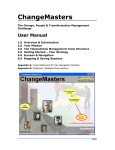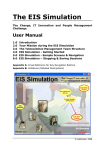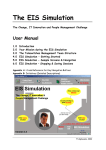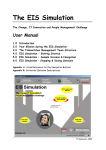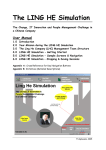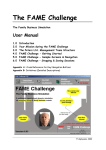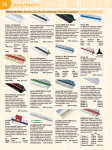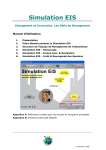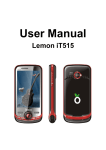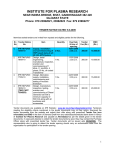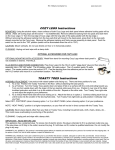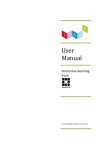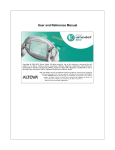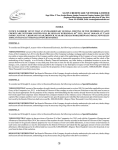Download ChangeMasters
Transcript
ChangeMasters
The Change, People & Transformation Management
Challenge
User Manual
1.0
2.0
3.0
4.0
5.0
6.0
Overview & Introduction
Your Mission
The Doon Technology Management Team Structure
Getting Started – Your Strategy
Screens & Navigation
Stopping & Saving Sessions
Appendix A: Cross Reference for Key Navigation Buttons
Appendix B: Initiatives (Detailed Descriptions)
ChangeMasters Simulation 2.9 Indian; 2012
1.0 Overview & Introduction
With ChangeMasters you will be challenged to simulate a 6-month change
management intervention in a large organization (Indus Communications Group).
Your mission is to successfully deploy the Group’s corporate PMS (Performance
Management System) in a newly acquired company so that its performance management
processes are harmonized with those of the Group.
In practice, the Indus Communications’ Board has given you a challenging mission, which
will absorb all your time and attention over the next 6 months. The mission is in fact
both critical and difficult. Two years after the acquisition Doon Technology has not yet
introduced the performance management processes and systems which are now used
consistently and successfully throughout the Group. It’s up to you and your Team now, to
fix this, persuading the top management team of Doon Technology (a group of very
successful, but also very autonomous executives) to finally align to the Groups’ global
processes and start using the corporate Performance Management System (PMS), which
will increase consistency, transparency, comparability and ultimately
performance
corporate-wide.
To complete your mission successfully, you will be free to choose among many
different initiatives/actions/change tactics. In some cases, you may gather
information on the managers (their backgrounds and roles, or also some insights on who
regularly drinks coffee with whom, etc.). In other cases, you may take direct action to try
to persuade the managers and thus influence their willingness to switch from their current
processes and systems to the global ones.
Each time you will decide to implement an initiative, you will receive qualitative and
quantitative feedback about the impact of your decisions. You will also see the time
passing, as every time you will decide to undertake something, this will obviously require
time to be completed. And remember that you will be operating under time constraints!
The following sections illustrate in more detail the main elements of the Simulation, and
explain the different screens and options.
QuickReading Advice:
Just read the Mission Section (2.0) to better understand the context in which you and
your team will operate.
The rest of the manual (Section 3-6) just explains in more detail the user interface of the
software you will be using during your mission.
Page 2
ChangeMasters Simulation 2.9 Indian; 2012
2.0 Your Mission
> The Context
You and your team have just been
appointed by the corporate HQ of Indus
Communications, a large multi-national
group,
to
a
challenging
change
management mission:
Over the next 6 months you will be
operating at Doon Technology, a
recently
acquired
company.
Your
objective there is to persuade a
successful but very independent-minded
top management team to harmonize
their
performance
management
processes and systems to the ones of
the whole group by adopting the
corporate
Performance
Management
System (PMS).
Indus Communications, your company, is a global corporation, which over the last 10
years grew and expanded tremendously through entering new markets and through the
acquisition of companies like Doon Technology, which joined the group almost 2 years
ago.
Doon Technology is the most successful recent acquisition of Indus Communications. It
is considered by everybody as the "cash cow" of the whole group, and is run proudly and
independently by Anil Verma, the CEO, and his management team.
PMS is the name of the intranet-based performance management system Indus
Communications has deployed over the last 2 years to make sure that goals are set
consistently and monitored continuously corporate-wide. It is said to be the 'backbone' of
the whole corporation, providing "Everybody with the information they need to make good
decisions and focus on what really matters for the group", as well as a way for everybody
to report data and monitor the achievements of goals regularly and systematically. Over
the last two years the PMS has been deployed successfully corporate-wide and adopted by
all the subsidiairies except Doon Technology, where the CEO - Anil Verma - has
systematically delayed its implementation, in spite of the repeated requests of Indus
Communications' HQ.
> PMS: New Performance Management processes and systems for Doon
Technology
In general terms, Performance Management
Systems provide managers of large companies
with processes and tools supporting them in
setting both personal and departmental goals,
and then monitor and report systematically
on progress towards the achievement of those
goals. At the same time, they change the
internal reporting system introducing the
transparency necessary to aggregate data
corporate-wide and allow top managers to
answer questions like "How are we performing
in this region?" "Which department or sales
office is less efficient?" "Based on actual
performance trends, which know-how and best
practice should be exchanged or transferred
among business units?" etc.
Page 3
ChangeMasters Simulation 2.9 Indian; 2012
The fact that Doon Technology has not adopted the PMS system yet is extremely
disturbing for Headquarters. Such systems need to be adopted consistently by everybody
in order to really increase overall performance, as otherwise information cannot be
consolidated appropriately at the top.
For Doon Technology, adopting the corporate PMS represents a significant change and
departure from the systems and processes they had deployed and used successfully
before being acquired by Indus Communications. At the time of the acquisition, Anil
Verma indicated lots of enthusiasm for integrating all the processes of his company to the
ones of the group, but since then Doon Technology did not change a lot its way of
operating.
In particular, all the attempts of HQ to introduce the PMS at Doon Technology have
failed until now. Sending information about the advantages of the corporate PMS and
news about its successful adoption in other subsidiaries didn’t help. Anil Verma seemed
simply too busy running his successful company to have time for introducing such a new
system. The "excuses" he presented (lack of time and resources, other priorities, etc.)
have thus slowed down and hindered the efficient roll-out of PMS corporate-wide.
> Your Challenge
In summary, your challenge is to persuade the CEO of Doon Technology, Anil Verma, and
his top management team to finally adopt the PMS and harmonize their processes
and systems to the ones of the whole group.
The HQ has given you up to 6 months (120 days) for this project. During this time, you
will be able to:
Gather
information
about
the
management team of the company,
Implement
different
management initiatives,
Continuously
monitor
your
progress in helping the 24 members
of the management team to move
through the phases of AWARENESS,
INTEREST,
TRIAL
and
finally
ADOPTION of this new way of working
change
Your and your team's personal objective is to get as many adopters as possible! This is
the way your performance will be evaluated by HQ at the end of the 6 months.
Attention: Balaji Bhatia, the Financial Controller, and Cia Sengupta, the CEO's Personal
Assistant, are not supposed to adopt and use the PMS. Hence the maximum number of
adopters you can reach is 22.
ChangeMasters Simulation 2.9 Indian; 2012
> How to go about it
Changing the way people think and behave in organisations is not a simple task and often
requires a combination of different tactics to be used at the right time with the right
people. This simulation will make it possible for you to experiment with the
implementation of different types of change management initiatives.
But ultimately your strategy, your change diffusion approach, your capabilities as a team
to discover what is most appropriate at Doon Technology and how to best persuade this
group of managers will determine how successful your intervention will be.
Accordingly, before plunging into your first decision, we advise you to:
(1) try to understand the context in which you are going to work, as well as your
role. Remember that you have been sent there by the Group HQ!
(2) review the different initiatives you will be able to launch to change people
attitudes!
(3) develop a "general strategy" which will guide you through the project ("topdown", "bottom-up", etc.) and write it down!
Good luck!!
To leave the ‘Mission’ screen, click on the ‘Back to the Action!’ button.
Page 5
ChangeMasters Simulation 2.9 Indian; 2012
3.0 The Doon Technology Management Team Structure
(OrgChart)
The above screen, ‘Org Chart’, shows what is displayed if you click on the ‘Org. Chart’
button at any time during the simulation once you begin.
It is the organisational chart of the management team of Doon Technology Ltd in which
you are expected to introduce your innovation during the next 6 months.
The management team of the company consists of 22 managers, an External Financial
Controller and the CEO's Personal Assistant. The picture of each person appears when you
position the cursor on the name. If you then click on the box, you will also get the profile
of that person.
You can access this chart at any time during the simulation, and return to where you were
in the simulation by clicking the ‘Back to the Action’ button.
Page 6
ChangeMasters Simulation 2.9 Indian; 2012
4.0 Getting Started – A Strategy
Your second action, after reviwing your Mission, should be to click on the ‘Strategy’ button
in the middle oval box of the screen and summarize the strategy you are planning to
adopt. Start developing an initial strategy. During the simulation you will be able to come
back to the Strategy page anytime you want to review it in the light of the information
and feedback you have obtained.
After having completed your Startegy page, click on the ‘Back to the Action’ button.
Page 7
ChangeMasters Simulation 2.9 Indian; 2012
5.0 Screens & Navigation
5.1 Control Panel
On the left hand side of the screen you will see displayed the list of the managers you are
trying to convince to adopt the corporate Performance Management System.
A variety of information about these managers can be accessed from this ‘Control Panel’
screen (depending on the initiatives you take). A status on what you know about a person
can be accessed by placing the cursor over the bubble to the left of the person’s
name. A personal profile can be retrieved by clicking on the (i) bubble to the left of the
person’s name.
The red bars displayed in the box to the right of the managers' names indicate how
successful you are currently being in changing the attitude of each manager towards the
change that you are trying to introduce.
You can see that the managers all go through a cycle of adoption, although at different
paces, and can be ‘not aware’ yet at all of your change project, ‘aware’, ‘interested’, or
they are starting to have first direct experiences with the new PMS (‘trying’) or might
have already ‘adopted’ it.
You can access the ‘Control Panel’ anytime to monitor your progress on the top left hand
side of the screen.
Part of the scoring summary at the end of the simulation is a function of the red bars
representing the degree of positive attitude that you have achieved for each manager.
Page 8
ChangeMasters Simulation 2.9 Indian; 2012
5.2 Personal Profile
The left hand side of the above screen shows an example of the personal profile, which
can be accessed by clicking on the (i) bubble to the left of the person’s name or clicking
on their name from the ‘Org Chart’ screen. You can also switch quickly between Personal
Profiles by clicking on the arrows on either side of the person’s image. Access to this
information is dependent on the initiatives you have taken.
Click the ‘Control Panel’ button on the top left of the screen to return to the list of all
managers.
5.3 Status
The right hand side of the above screen shows a status on what you know about a person.
This can be accessed by placing the cursor on the left of the person’s name without
clicking. The color reflects the current adoption stage.
Page 9
ChangeMasters Simulation 2.9 Indian; 2012
5.4 Initiatives
On the right hand side of the screen, if you click on the ‘Initiatives’ button you will see the
above screen, which lists the change management initiatives you may launch during
the simulation.
A description of each particular initiative will be displayed below this list if you click on
any initiative name. You may also click on ‘Detailed Descriptions’ and scroll through the
descriptions of all initiatives at once (see also an Overview in Appendix B).
You may also take a decision starting from the ‘Initiatives’ screen. To implement an
initiative from this screen, highlight the initiative and click on ‘Implement It’. This will
bring the ‘Take Decision’ screen up (see 5.5) with the initiative already chosen, and a
prompt for any other details you need to provide (i.e. the names of managers involved).
Page 10
ChangeMasters Simulation 2.9 Indian; 2012
5.5 Take Decision
On the right hand side of the screen, if you click on the ‘Take Decision’ button you will see
the above screen, which shows the number of the decision you are about to take.
To implement an initiative, click on the “Your initiative” box and select the initiative
from the drop down menu that appears. You will also be prompted for any other details
you need to provide (ie. Names of people involved). This can be chosen either by clicking
on the name of the person on the ‘Control Panel’ (left hand side of screen), or
clicking on the box, and selecting the manager (s) from the drop down menu of names.
If you make a mistake in choosing the initiative or name, or click on the box with the
wrong details in it, select ‘Don’t Do It’ instead of “Implement the Decision’ at the
bottom of the screen.
For each decision, you can optionally complete the ‘Your rationale for this decision’ box.
After clicking on ‘Implement the Decision’. You will receive immediate feedback on your
chosen initiative. You will receive a summary of the outcome, a positive or negative
indication of any attitude changes of the managers involved (and maybe not involved),
and the clock will continue ticking off along the bottom of the screen (against the 6
months) for the time taken to implement the initiative.
Page 11
ChangeMasters Simulation 2.9 Indian; 2012
5.6 Org Networks button
Click on ‘Org Networks’ and you can access information regarding the managers - who
has coffee with whom – (‘Coffee’), who socialises with whom – (‘Social’) and who is on
which task force with whom – (‘Task Forces’). Access to this information is dependent on
the various initiatives you have implemented.
5.7 Insights & Issues
This Version of the Simulation provides the possibility to take notes anytime during
a session. This Learning Notebook, accessible by selecting
in the
upper right side of the screen also provides a structured way to summarize key
insights and issues after completing a session.
Page 12
ChangeMasters Simulation 2.9 Indian; 2012
You may fill in the Do’s column on the screen to share “Insights” of what you have
learned from the experience as well as Dont’s column for the “Issues” of Change
Management you would like to know more about. You are able to print it on paper or
on a slide. The content of the Do & Dont’s sheet is recorded in the Session Report.
5.8 Track Record
Click on ‘Track Record’ at any point during the simulation and you will see a summary of
your initiatives to date that you can scroll through. For a detailed history of your
Initiatives: Decision #, Initiative, Rationale, Outcome (ie. the immediate feedback), and
No. of Adopters to date – click on ‘History Details’ and scroll through your results.
Page 13
ChangeMasters Simulation 2.9 Indian; 2012
5.9 Score
This shows the score sheet that is displayed if you click the "Score" button located on the
bottom middle of the screen.
You may click on this at any time to see how you are progressing, and you can return to
the simulation by clicking on the buttons at the top of the screen.
The thin blue line on the graph (the top one) indicates the cumulative ‘positive attitude’
(ie. the red bars) you have succeeded in gathering. As you can see in the example in the
screen above, the cumulative positive attitude can decrease too during the project,
depending on your initiatives and other events that can happen during the 6 months
implementation period!
The thick red line (the bottom line) indicates the cumulative number of managers you
have convinced to adopt. Once someone has adopted they cannot move back through the
adoption process.
The numeric scores, the number of ‘Days per Adopter’, Elapsed Time, ‘# of Adopters’, and
‘# of Decisions’ ‘# of Attitude Points’ are on the top left of the screen.
Page 14
ChangeMasters Simulation 2.9 Indian; 2012
5.10 Save Session Report
You may save your session’s report at any time during the simulation by clicking on the
“Save Session Report” button on the right hand side of the “Score” screen. The report
allows you to get details about the session including: the date of running, number of
adopters, number of initiatives and the time spent to implement these initiatives and of
course the key points of the adopted strategy and also the content of do and dont’s
learning points. Beside you will also get all the information on the adoption stage of each
person as well as the feedback for each implemented initiative.
5.11 Credits Screen
This screen provides information about the simulation and those who have contributed to
its design, development and continuous updating. It is displayed if you click on the
‘ChangeMasters’ button located on the bottom left hand corner of every screen.
Page 15
ChangeMasters Simulation 2.9 Indian; 2012
5.12 Print
The ‘PRINT’ button allows the printing of any page in the Simulation (e.g the SCORE
page). In case you print directly on a transparency, you will have to insert the
transparency in the printer and choose the appropriate printing options.
6.0 Stopping & Saving Sessions
6.1 Stopping & Restarting
This Version of the Simulation allows you to “stop” a session anytime you want and
“resume” it at a later stage. To “stop” the session, just quit the simulation software
by selecting
. The current session will be automatically saved in the file
“EISMission.eis”. To “restart” a session just select
which will appear automatically on the Main Screen the next time you will enter the
simulation software.
6.2
Automatic Saving before Quitting a Session
This Version of the Simulation automatically saves a copy of the session every time
you quit the simulation software (in addition to producing the Report in editable
form). Hence the latest state of the session is always stored in the file
“EISMission.eis” and can be reloaded. You can always restart your session from the
point you left it by selecting
after restarting.
Page 16
ChangeMasters Simulation 2.9 Indian; 2012
APPENDIX A
Cross Reference for Key Navigation Buttons (at Top of Screen)
Control Panel (People & Progress)
Org. Chart
Org. Networks
Initiatives
Track Record
Insights & Issues
Take Decision
Our Strategy
Refer
Refer
Refer
Refer
Refer
Refer
Refer
Refer
5.1
3.0
5.6
5.4
5.8
5.7
5.5
4.0
Cross Reference for Key Navigation Buttons (at Bottom of Screen)
Mission
Score
Print
Quit
ChangeMasters (Credits)
Page 17
Refer
Refer
Refer
Quit
Refer
2.0
5.9
5.12
5.11
ChangeMasters Simulation 2.9 Indian; 2012
APPENDIX B
INITIATIVES
SEEK ADVICE: Organise a meeting with any one
member of the top management team in order to get
some advice on how to approach the PMS project in the
most effective manner. (2 days) NOTE – You will not
actually receive advice in the feedback message; the
aim is to influence the person you visit by taking the
‘humble’ approach.
PERSONAL PROFILES: Build a personal profile on any
five members of the top management team by talking
informally with your network at Indus Communications
HQ. (2 days) NOTE – Each person’s profile includes a
qualitative description of the individual and an
indication of how difficult it will be to move that
individual through the four change phases.
TASK FORCES: Discover which top managers are on
the company’s three main task forces. (1 day) NOTE –
These membership lists will not change, and will
remain available throughout the simulation.
INTERNAL MAGAZINE: Ask the editor of the internal
magazine to include a short article you write on the
advantages that PMSs can bring to managers. (3 days)
NOTE – This magazine is distributed to all of the top
management team. The article is about the generic
advantages of PMS, and does not include any company
specific information.
DIRECTIVE: Try to convince the CEO to send out a
directive to everyone on the top management team
insisting that they start using the PMS in two weeks’
time. (7 days) NOTE – You spend several days writing
a draft of this directive to give to the CEO.
COVERT LOBBYING: Without the formal approval of
the Directors concerned, suggest to a group of selected
Managers that they meet the CEO to lobby for the
implementation of the PMS. (8 days) NOTE – This
initiative assumes that you have identified the
appropriate Managers to approach, and does not
require you to specify them.
ELECTRONIC MAIL: Send a brief electronic mail to
everyone on the top management team explaining your
ideas on why a PMS makes sense for them. (1 day)
NOTE – All of the top managers have an individual Email account.
MANAGEMENT TRAINING: For five members of the
top management team, organise a 3-days residential
training program at a nearby business school on the
potential benefits of a Performance Management
System and how to actually use such a system. (5
days) NOTE – You do not attend the programme, but it
takes a considerable amount of your time to plan it.
DIRECTORS
MEETING:
Organise
a
special
interdepartmental meeting in the main conference
room with all the five directors and the CEO to share
and discuss thoughts and plans for the PMS project. (3
days) NOTE – Directors are informed that they can
also bring along Managers from their department.
Page 18
WORKSHOP: Help one of the top managers to
organise and lead a demonstration and discussion
session on PMS for all the top managers interested in
the topic. (5 days) NOTE – This will provide the
opportunity for the workshop leader to share and
gather views and experiences on PMS.
FACE-TO-FACE MEETING: Fix a meeting with one of
the top managers in order to persuade him/her that the
Performance Management System would make sense to
implement. (1 day) NOTE – The meeting will take
place in the manager’s office.
COFFEE BREAK: Spend some time at the company bar
in order to see which groups of top managers meet
regularly for a coffee. (3 days) NOTE – These groups
will not change, and the list will remain available
throughout the simulation.
MEMORANDUM: Write and send to any five of the top
managers a brief memo on how some of the specific
features of the PMS will improve transparency of
information flows in the company. (1 day) NOTE – This
is distributed in the company internal mail system.
PILOT TEST: Try to get commitment from one of the
top managers by asking him/her to organise a twoweek-long pilot test of the PMS in his/her department
using current company data. (4 days) NOTE – This will
involve setting up the PMS on all the department’s
computers and providing users with the appropriate
training.
PLENARY MEETING: Develop a presentation on the
PMS Project, and present it during the regular weekly
top managers staff meeting attended by everybody. (5
days) NOTE – The presentation includes potential
applications of the PMS within the different
departments. All members of top management are in
principle expected to attend these meetings.
QUESTIONNAIRE: Write and distribute to all the top
managers a questionnaire aimed at assessing their
current level of interest in becoming regular PMS users.
(2 days) NOTE – The main objective of using this
questionnaire is to demonstrate your approach to the
project rather than gathering additional information.
EXTERNAL SPEAKER: Organise a speaker event in
which Professor Tom Petersen, an expert on
Performance Management, will deliver an address
entitled: "PMS: Liberating performance in the
organisation". (5 days) NOTE - Everyone in the top
management team is invited by memo to this event,
but attendance is optional.
NETWORKS: Spend some time observing or finding
out which top managers go together regularly to the
company health club, who is involved in the local
charity campaign, and who is looking informally at
environmental issues together. (5 days) NOTE – These
groups will not change, and the lists will remain
available throughout the simulation.
ChangeMasters Simulation 2.9 Indian; 2012


















